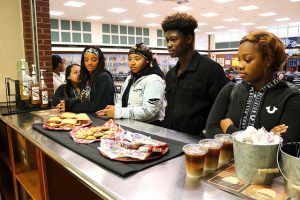 A group of students gathers around a section of the cafeteria. Chatter and low-volume conversations can be heard as students sip hot or iced coffee, munch on breakfast sandwiches, enjoy yogurt parfaits, and get ready to learn.
A group of students gathers around a section of the cafeteria. Chatter and low-volume conversations can be heard as students sip hot or iced coffee, munch on breakfast sandwiches, enjoy yogurt parfaits, and get ready to learn.
This is not a college campus or city center plaza. This is a pilot program set to take place at five DeKalb County School District (DCSD) high schools, including Columbia, Lithonia, Southwest DeKalb, Stephenson, and Stone Mountain after Spring Break 2019.
With the new program, students and staff will be able to enjoy an extended breakfast menu with items not normally offered at a traditional high school, including flavored hot or iced coffee, juice, fresh fruit, yogurt parfaits, healthy breakfast sandwiches, scones, and more. The service will work in conjunction with normally scheduled breakfast times to promote cafeteria services to students.
According to School Nutrition Services Executive Director, Dr. Connie Walker, the new program is a partnership between DCSD and the Atlanta Community Food Bank designed to encourage students to eat breakfast on campus.
“This is all to support student participation at school,” said Dr. Walker. “Breakfast is the first, most important meal of the day, but many high school students choose to skip it or get the same items somewhere else. We want them to take advantage of the services we have, show up early to school, and attend class more. We’re willing to meet them by any means necessary.”
Dr. Walker hopes to extend the program across the district if the pilot program proves to be successful. She is in scheduled talks with the Atlanta Community Food Bank, who has provided $2,500 per site for equipment costs.
In late February, Stephenson High School students and staff obtained a first look at the program as part of a surveyed taste test. A similar taste test took place at the Robert R. Freeman Administration & Instructional Complex.
 After enjoying their respective food and beverages, attendees completed questionnaires and provided suggestions on how to perfect the program. More than 135 students and staff provided input.
After enjoying their respective food and beverages, attendees completed questionnaires and provided suggestions on how to perfect the program. More than 135 students and staff provided input.
Menu items were decided upon and facilitated by District Chef and Cafeteria Manager Trainer Samantha Sixto-Rumley. She was pleased to see students enjoy every item and cannot wait to extend the program to other schools.
“It went well—we expected a smaller group, but it was exciting to see how ecstatic the students and staff were,” Sixto-Rumley said. “We took away some great information about how to move forward, how to keep the flow, how to maximize staff time, and how to work with the space available at Stephenson. We’ve heard back that teachers are very much looking forward to it!”
Like Dr. Walker, Chef Sixto-Rumley hopes the extended services at each high school result in greater breakfast participation, which can eventually dovetail into greater attendance at school overall.
“We are maximizing the palate of each student,” Chef Sixto-Rumley said. “We want students coming into the building earlier, as they’re more likely to go to class afterward. That’s why School Nutrition Services is here: we’re providing a product to get them here in the building, provide healthy goods, and get students to class. We’re giving them the brain power required and supporting teaching and learning.”
